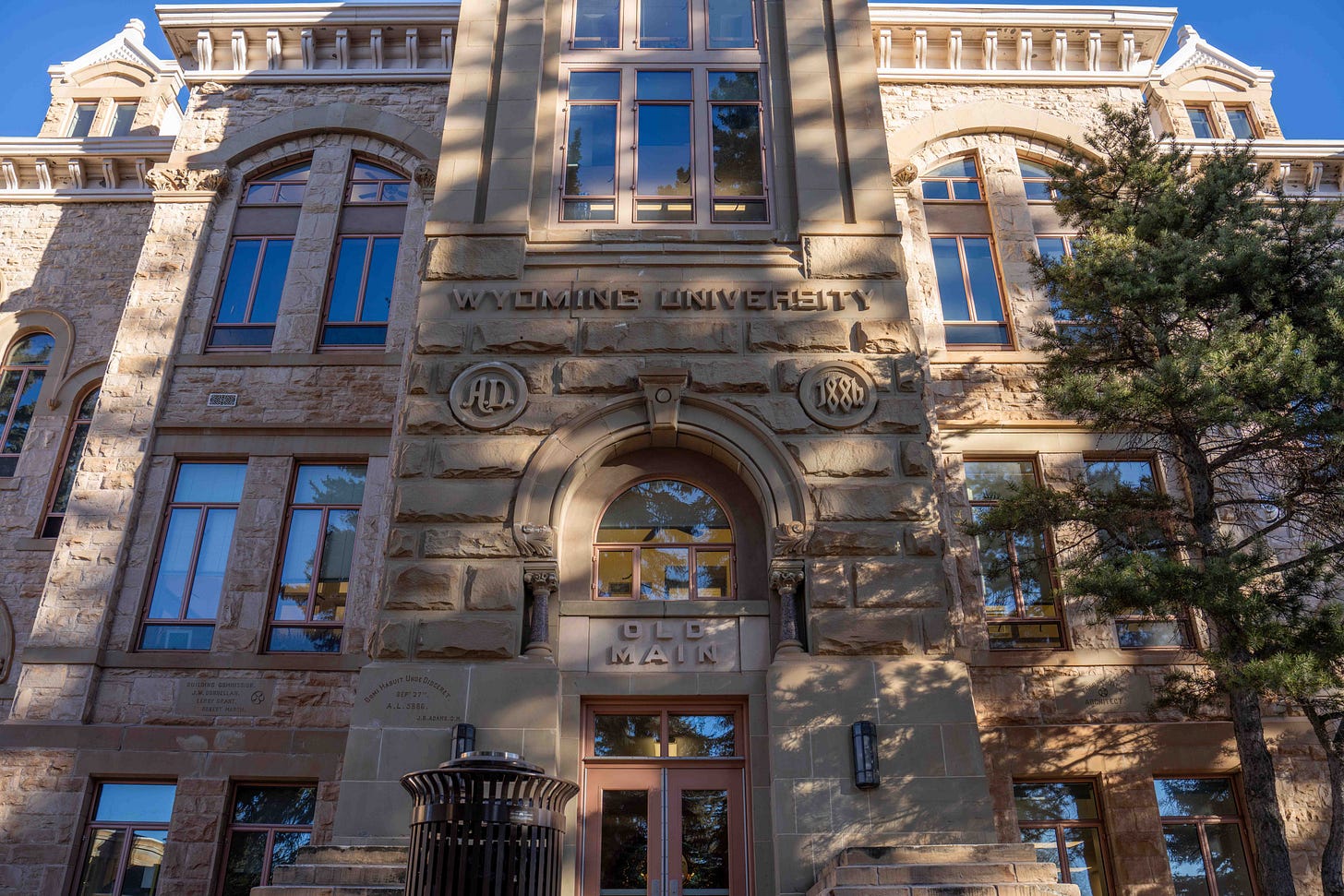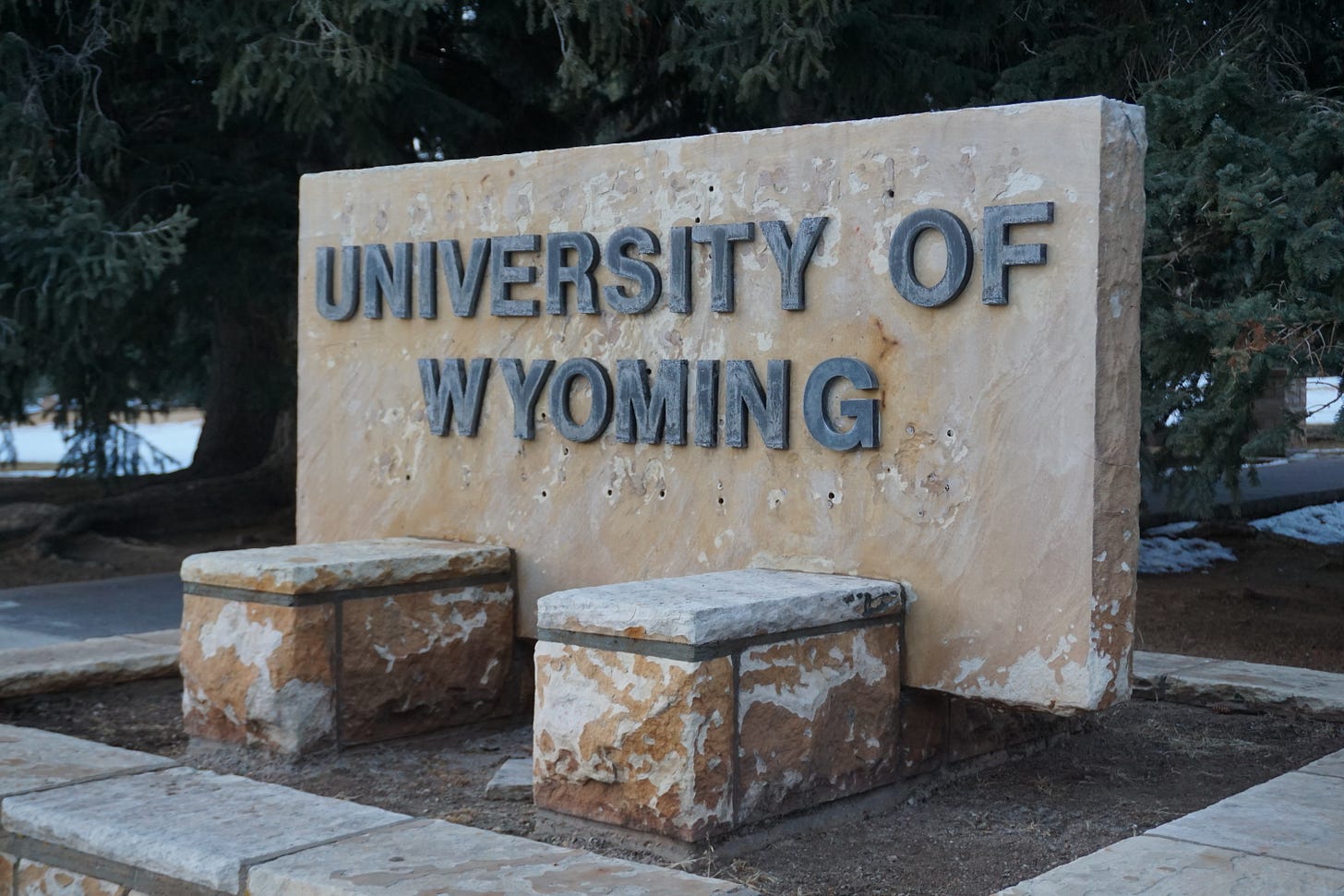Legislature approves $504 million UW budget
Gender studies appears safe while DEI remains on the chopping block, but the governor will have final say over the university’s funding. UW held onto most of the exception requests it made.

The Wyoming Legislature’s final state budget — which will direct government spending for the next two years — sets aside almost $504 million for the University of Wyoming.
On top of maintaining current UW services and programs, that funding includes support for a new well-being center, stipend raises for graduate assistants, additional staff positions, and new research. While the funding for AI research is significantly less than UW was hoping for, the School of Energy Resources could receive the full $23 million it asked for, including $17 million for a coal-derived asphalt pilot program.
While the Senate had voted to eliminate courses in gender studies, the footnote axing that program was removed during the conference process, when the House and Senate had to agree on a unified budget bill. However, a footnote eliminating the Diversity, Equity and Inclusion Office — and forbidding UW from advancing those concepts more generally — is still part of the bill.
But none of this is set in stone just yet. The legislature has advanced its final version of the state budget — after much delay and infighting — but neither UW nor any other state agency can be certain about its final biennium budget until the bill’s been signed by Gov. Mark Gordon.
Now that the 2024 session is concluded, the legislature will not be able to override Gordon’s line-item vetos, meaning those vetoes will represent the final say.
UW can still offer gender studies courses
During the chamber’s third and final reading of the budget bill, the Senate took aim at the “wokeness” the university is allegedly pushing onto students.
Sen. Cheri Steinmetz (SD-3) led the charge, first bringing an amendment to forbid UW from teaching gender studies courses, then another amendment to defund UW’s Office of Diversity, Equity and Inclusion.
Both amendments, especially the move to ban gender studies, inspired vehement debate on the Senate floor.
Sen. Bo Biteman (SD-21) said his constituents didn’t want any of UW’s appropriations funding courses they disapproved of.
“I have some cowboys back home that have some pretty colorful language when it comes to this that I won’t repeat on the Senate floor,” he said. “But this is one area where they’re saying, ‘Come on guys, what are you doing here?’ This is Wyoming. Are we going to change our mascot to the Social Justice Warriors? Because that’s where we’re going with this university. And they’re begging us to rein this in.”
Sen. Bob Ide (SD-29) added the purpose of going to university was to find employment and he didn’t see how gender studies helped with that. Steinmetz accused UW of pushing “more of an ideology than a program.”
The Gender and Women’s Studies program at UW does not push any one ideology. Its mission is to critically examine power structures and institutions through feminist and queer lenses, as well as from the perspective of indigenous, environmental, immigration, labor and economic justice movements. As with any other academic discipline, there are significant disagreements between scholars in this field about the nature of power, the origins and causes of societal imbalances, even the acceptance and validity of transgender individuals.
But few arguments were raised in favor of the field itself. Rather, defenders of UW’s gender studies courses like Sen. Chris Rothfuss (SD-9) argued it was inappropriate for the government to “shield” Wyoming residents from ideas legislators don’t like.
“The idea that a majority of the legislature gets to cancel ideas at a university, ideas that are being sought out and embraced by the students — our students, our children, at that university — seems unacceptable and certainly seems beyond the role of what a legislature should do,” he said. “My kids are not afraid of ideas.”
The footnote axing gender studies was approved by the Senate on an 18-13 vote. But the House had rejected a similar amendment, and the Senate footnote was removed during the conference process.
An uncertain future for UW’s diversity efforts
Steinmetz’s amendment to ax the DEI Office was more successful. That amendment cut UW’s budget by $1.7 million and forbade the university from expending any funds “on the office of diversity, equity and inclusion at the University of Wyoming or on any diversity, equity and inclusion program, activity or function.”
The amendment received colorful input from the senators.
Sen. Charles Scott (SD-30) called the office a “monolith of wokeness” and said programs of this sort were the source of “rot” within so many liberal arts colleges. Sen. Anthony Bouchard (SD-6) blamed DEI programs for recent airplane failures. Sen. Troy McKeown (SD-24) suggested Wyoming should not embrace the modern ideas such an office represents.
“I had a hat once that said, ‘Welcome to Wyoming, set your clock back 10 years,’” he said. “I really liked it.”
Rothfuss, who works as an assistant professor in the UW Honors College, once again defended the university’s funding, but to no avail. The amendment passed with a 20-11 vote and made it into the legislature’s final state budget bill.

$25 million for energy extraction research
The legislature’s final budget includes a significant sum for energy research projects.
In addition to the $17 million set aside for the School of Energy Resources to demonstrate a new coal-derived asphalt technology, the budget also offers up $25 million for matching grants to support research conducted at the High Bay Research Facility.
The research would focus on “geologic formations and energy extraction opportunities that may be found within Wyoming.”
Thermo Fisher, a manufacturer of biotech and other scientific equipment, had committed to offering High Bay $75 million in in-kind contributions — such as the donation of equipment — if the state could match those donations with cash. So UW requested $75 million from the state, seeking to match as much of that offer as it could. The $75 million was initially approved by the Joint Appropriations Committee before being reduced to $25 million in the budget bill that committee sent to the full legislature.
Professor Mohammad Piri conducts and oversees research into the flow of liquids through “porous media.” The cutting edge research could have implications for various scientific disciplines but is especially valuable to the oil and gas industry.
If Piri and his colleagues at High Bay can secure funding from both Thermo Fisher and the state, the professor told the appropriations committee in January it would allow for the creation of a new division advancing humanity’s understanding of the way fluids move through 3D space.
“This new division will take the university's porous media center and the University of Wyoming and the state of Wyoming to an entirely new level in this area,” Piri said.
The $25 million for matching grants currently included in the budget dictate that UW must prioritize “conducting all computational and practical research to the greatest extent reasonably possible with University of Wyoming students within Wyoming” and “to the extent possible, developing any feasibility studies, small-scale experiments or large-scale projects associated with research funded by this appropriation within Wyoming.”
House adds $2.5 million
During the House’s second reading of the budget bill, Rep. Bob Davis (HD-47) brought an amendment to support the field of rangeland management, increasing UW’s budget by $2.5 million.
The added footnote sets aside that money for matching grants that support “excellence in research, education and extension in ranch and rangeland management, agronomy and soil science.”




